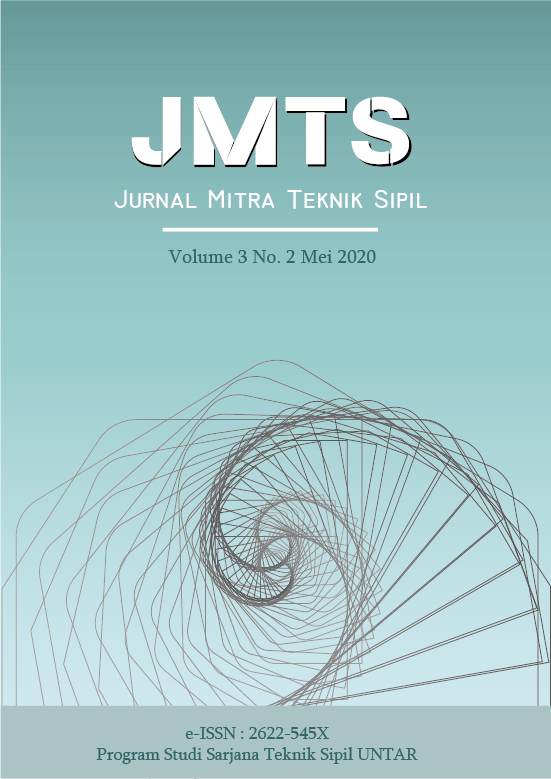VALIDASI PREDIKSI DURASI DENGAN METODE EARNED SCHEDULE UNTUK GEDUNG BERTINGKAT DI JAKARTA
Main Article Content
Abstract
ABSTRACT
The problem of project delays is often found as the construction industry develops. Various methods have been developed to overcome this problem, one of them is Earned Schedule. This method was developed from Earned Value by replacing the cost indicators contained in Earned Value into a time indicator. This study aims to determine whether the Earned Schedule method is feasible to predict the final duration for a multi-storey building project in Jakarta.This research was conducted by comparing the average of two populations between the average population duration with Earned Schedule and the average population duration of realization taken from reality. Furthermore, the sample of the population average is tested through the hypothesis test of the average difference to find out whether the two samples are in the same population. The data collected in this study were 52 on-going s-curve data and 35 predicted s-curve data. As a result, the final duration prediction population using the Earned Schedule method does not have an average difference with the predicted final duration population. Thus, the Earned Schedule method is considered appropriate to be used to predict the final duration of a high rise building project in Jakarta.
ABSTRAK
Masalah keterlambatan proyek sering ditemukan seiring berkembangnya industri konstruksi. Berbagai metode dikembangkan untuk mengatasi masalah ini, salah satu metode tersebut adalah Earned Schedule. Metode ini dikembangkan dari Earned Value dengan mengganti indikator biaya yang terdapat pada Earned Value menjadi indikator waktu. Penelitian ini bertujuan untuk mengetahui apakah metode Earned Schedule layak digunakan untuk memprediksi durasi akhir untuk proyek gedung bertingkat di Jakarta. Penelitian ini dilakukan dengan cara dengan membandingkan rata-rata dua populasi antara rata-rata populasi durasi dengan Earned Schedule dan rata-rata populasi durasi realisasi yang diambil dari kenyataan. Selanjutnya sampel rata-rata populasi tersebut diuji melalui uji hipotesis selisih rata-rata untuk mengetahui apakah kedua sampel tersebut berada dalam satu populasi yang sama. Data yang terkumpul pada penelitian ini adalah sebanyak 52 data kurva-s on going dan 35 data kurva-s realisasi. Hasilnya, populasi prediksi durasi akhir dengan metode Earned Schedule tidak memiliki selisih rata-rata dengan populasi prediksi durasi akhir realisasi. Dengan demikian, metode Earned Schedule dinilai cukup layak digunakan untuk memprediksi durasi akhir proyek gedung bertingkat di Jakarta.
Article Details
Section
References
Anondho, B., Wiyanto, H., dan Putra, D.W. “Model Validasi Penerapan Hasil Pengembangan Earned Value Method Untuk Perkiraan Durasi Akhir Proyek Konstruksi Di Jakarta”. Konferensi Nasional Teknik Sipil, Vol. 11. 2017.
Anondho, B. “Pengembangan Model Prediksi Durasi Probabilistik Proyek Pembangunan Gedung Bertingkat Tinggi Berbasis Faktor Pengaruh Eksternal Terukur,” Disertasi, Universitas Indonesia, Indonesia. 2018.
Kim, Byung-Cheol dan Kim, Hyung-Jin. “Sensitivity of earned value schedule forecasting to S-curve patterns”. Journal of Construction Engineering and Management, Vol. 140, Issue 7. 2014.
Lipke, W. “Statistical Methods Applied to Project Management”. PMI – Olakhoma City Chapter. 2007.
Lipke, W. “Earned Schedule Schedule performance analysis from EVM measures”. Projects and Profits Magazine, India, Vol. XIII, Issue 1. 2011.
Lipke, W. “Schedule is Different”.The Measurable News. 2003.
Lipke, W., Zwikael, O., Henderson, K., dan Anbari, F. “Prediction of project outcome: The application of statistical methods to earned value management and earned schedule performance indexes”. International Journal of Project Management, Vol. 27, No. 14. 2009.
Narbaev, T., De Marco, A. “Combination of Growth Model and Earned Schedule to Forecast Project Cost at Completion”. Journal of Construction Engineering and Management, Vol. 140, No. 1. 2014.
Wicaksono, Y. Seri Solusi Bisnis Berbasis TI: Aplikasi Excel Dalam Menganalisis Data. Alex Media Komputindo: Jakarta, 2006.

